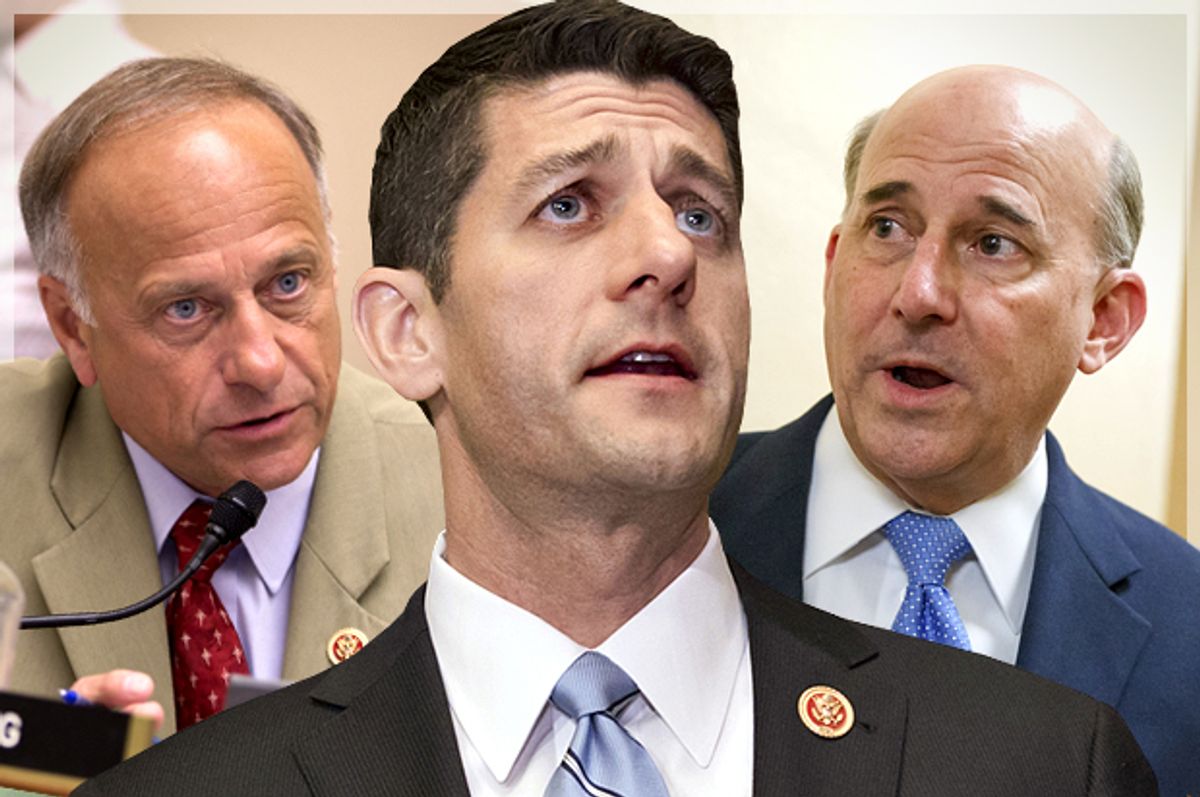After repeated denials and refusals to even publicly entertain the possibility of becoming House Speaker, Paul Ryan is (perhaps) ready to become House Speaker. But he has terms. Ryan wants the demanding job to be scaled back a bit so that he has time to spend with his family. He also wants the party to unite behind him and he wants that to happen almost immediately – he set a Friday deadline for endorsements. And, perhaps most significantly, he demanded that changes be made to the motion to vacate the chair, the procedural tool the extremists in the far-right House Freedom Caucus wielded to drive John Boehner from the speakership and blunt Kevin McCarthy’s ascension to the position.
Many observers are arguing that Ryan has outwitted the troublemakers in the House Freedom Caucus and put them in a difficult position. Here’s Time’s Jay Newton-Small crediting Ryan with a strategic masterstroke:
The move throws back the ball into the Freedom Caucus’s court, and boxes them in. If they dissent they will be blamed for the chaos that will more than likely ensue. And they will have to deal with 200-plus very angry colleagues, many of whom are already talking openly about doing a deal with Democrats to elect a consensus Speaker to end the turmoil. That outcome would be the exact opposite of what the Freedom Caucus hoped to achieve by deposing Boehner, whom they felt already caved too much to Democratic demands.
I don’t really see the logic here. The House Freedom Caucus’ influence is built on its ability to challenge the Speaker and create chaos within the House Republican conference. Its members clearly don’t have any qualms about pissing off the leadership or being blamed for it – indeed, they seem to take pride in their work and are quite good at it. Ryan, whom they were already cool towards given his past support for comprehensive immigration reform, is demanding that they agree to limit their ability to challenge his authority as Speaker. What incentive do they have to agree to this? If all paths lead to a Speaker they won’t be happy with, then it would seem to make more sense to stand firm and preserve the procedural tricks they’ve so far used to great effect.
Sure enough, as Roll Call’s Matt Fuller reports, the House Freedom Caucus is already griping about Ryan’s terms insisting that they won’t entertain any changes to the motion to vacate the chair:
“Never thought Paul Ryan would come in and say, ‘I want more power than John Boehner has,'” [Rep. Tim] Huelskamp said.
“How do you get rid of a speaker that has problems?” the Kansan asked. “Every organization, except for a dictatorship, has a motion to vacate the chair.”
Perhaps just as troublesome for Ryan’s speaker bid is the condition that the Freedom Caucus endorse him. One of the founding members of the group, Mark Meadows of North Carolina, told CQ Roll Call the group’s bylaws were “very clear” in requiring a four-fifths majority to come to such a position.
Most Republicans are so desperate to end the chaos and so enamored of Paul Ryan that they’re happy to give him anything he wants. Ryan wants to carve out sufficient time to spend with his family, which means dialing back the Speaker’s role as party fundraiser. Boehner was very good at raising funds for his members – he was apparently on track to raise $100 million this election cycle. Republicans in the House are willing to choke off this spigot of cash just to get someone to take Boehner’s job. The desperation of the rest of the Republicans and the fact that Ryan made his service contingent upon the House Freedom Caucus’ support would seem to empower the extremists.
The more interesting question is what happens if the House Freedom Caucus says no to Ryan’s demands. That would throw pressure back on to Ryan. In describing his thinking to reporters, Ryan said that he doesn’t actually want the job, but felt he had to step and offer himself out of a sense of greater purpose and service to country. "I came to the conclusion that this is a very dire moment not just for Congress, not just for the Republican Party, but for our country,” he said. “I think our country is in desperate need for leadership.” But, of course, he’d only do it if his terms were met. If his terms are rejected, is he going to walk back all that high-minded rhetoric about saving the party – nay, the very country! – at its moment of dire peril?
It’s all an open question, of course, given that the House Freedom Caucus isn’t what you’d call a “rational” group of human beings.


Shares